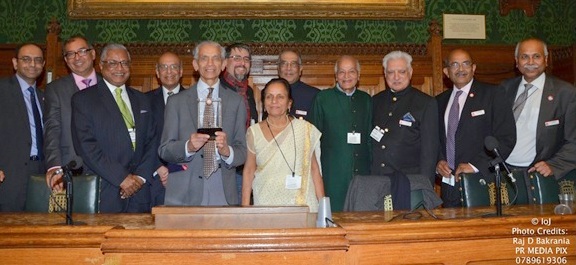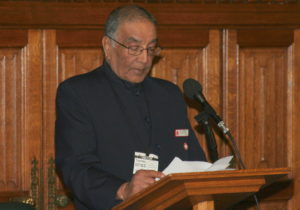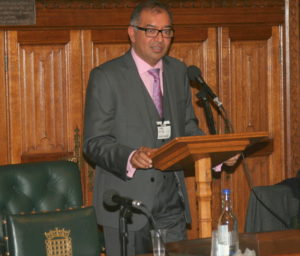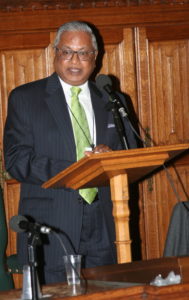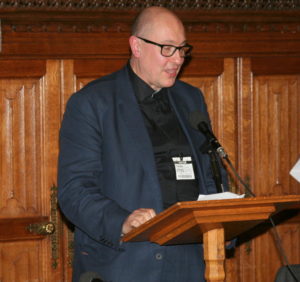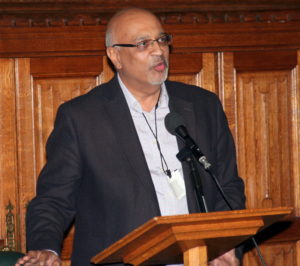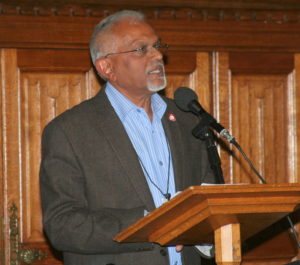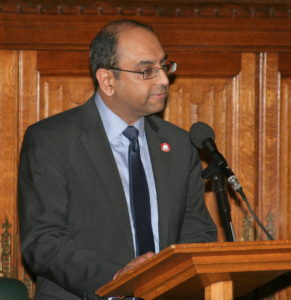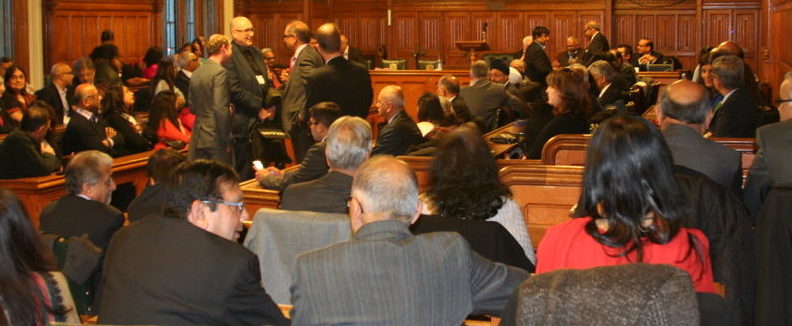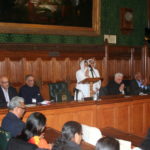
OneJAIN under the aegis of Jain All-Party Parliamentary Group (JAPPG) and the Institute of Jainology celebrated Mahavir Jayanti (Bhagwan Mahavir’s birth anniversary) as the first JAPPG event of 2017 at the House of Commons in London on Tuesday 7th March. The theme for the evening was ‘Effective Strategies to meet the Environmental Challenge’. Committee Rom No 14 in the House of Commons was filled up with approximately 200 invited guests well before the start time of 7 pm. Guests were parliamentarians, Jains, leaders of other faiths and members of partner organisations
Dr Mehool Sanghrajka, a Director of the Institute and the coordinator for the Mahavir Jayanti celebration program was the compere for the evening. He briefly welcomed the guests and invited the respected Samnijis from Jain Vishwa Bharti to recite the Navkar mantra for starting the auspicious event.
Following the recitation, Nemu Chandaria OBE, Chair of the Institute and coordinator of OneJAIN formally welcomed the guests and expressed his pleasure that so many guests had accepted the invitation to attend the first JAPPG event of 2017. He briefly outlined the activities of the Institute and OneJAIN group during the past 12 months. He announced that the first ever ‘OneJAIN Life Time Achievement Award’ was to be presented later during the evening.
Mr Bill Liao was the first Keynote Speaker. Mr Liao, an Australian entrepreneur is a venture capital investor, a diplomat, an author and an accomplished speaker amongst many other talents. He founded the Weforest, a global movement dedicated to planting trees. He was inspired by his little daughter’s simple question to him after watching a TV documentary about the effects of climate change. The question was ‘Can we not fix the planet?’ He had been approached by the Prime Minister of St Kitts & Nevis to represent his country on environmental affairs which he accepted and which helped him carryout a lot of his work. Getting any action through UN had been very difficult as no decisions could be arrived at unless there was a 100% consensus.
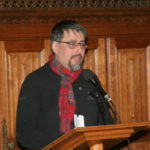
His biggest hurdle was to get access to the correct information on causes of the climate change – effects were widely reported but not the causes apart from talking about CO2 foot print. After much research, he found that trees make clouds and it is the cloud that can prevent the global warming. Institute of Oceanography confirmed this theory. He spoke to various foresters about this – whilst they were aware of this they had not done anything about it.
Carbon Dioxide was primarily responsible for global warming and it constituted about 400 parts per million of the atmosphere. With further research he realised that water vapour which constituted 1% of the atmosphere was much more potent that the CO2 as it doubled up the heating effect.
Part of the solution appeared to be to have more trees which would help convert the vapour in to clouds which in turn would reduce the warming effect. Providing only 2% more cloud cover would eliminate the problem to quite an extent.
At one time, there were over a trillion trees on the earth, that number has now been reduced to five billion. There is reluctance to plant new trees because of the fear of trees being cut down again for firewood.
However, if the trees were made to be productive – that is, if they could provide a livelihood then they would be protected and maintained. Trees once grown need very little maintenance and offer benefits like preventing soil erosion, maintaining the nutrient levels in the soil etc. Wildlife would also be revived if there was reforestation. Bill undertook to plant trees but initially he found the cost of saplings too high but now he has secured sufficient resources to reduce the cost to a minimal (less than a US$). To date he has planted over 15 million trees and in the process provided a livelihood to over quarter of a million women raising them out of poverty.
He has placed a self-imposed restriction on himself not to travel by airplanes until he has planted at least 100 million trees. His philosophy says ‘handouts do not work but handshakes do’ as everyone in the transaction is recognised and respected – this seems to produce the required results.
We wish Bill all the success in his venture WeForest and hope to see him flying in not too distant a future.
Our second keynote speaker was Mr Satish Kumar, a former Jain monk who walked over 8,000 miles to the capitals of the major nuclear powers to give a message of peace. Currently he is a Visiting Fellow at Schumacher College and has been the editor of Resurgence magazine for the past 43 years and is an environment activist. He congratulated the Institute for organising the event and said that Bhagwan Mahavir whose birth anniversary we had gathered to celebrate was the earliest member of the Friends of the Earth movement.
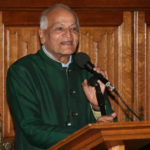
He started by showing the generosity of mother nature that though humans commit all kinds of atrocity on mother earth but planting of each seed in earth results in a beautiful fruit bearing tree. He went on to etymology of words – humans and humus and concluded that they had the same origins as both were made from the same kind of matter – earth, air, water and fire. It is the lack of humility in humans that has given rise to all the present day problems. Bhagwan Mahavir had said have reverence for all life but humans have ignored it. There is a belief that humans are the superior master race and in their selfish greed and arrogance have sought comfort and material welfare in their life at the expense of everything else on this earth.
A verse in Sanskrit from one of the Jain scriptures (Das Vaikalika Sutra) was quoted – that all living things wish happiness and one should not cause unhappiness by inflicting violence upon any other life for selfish motives.
Satish Kumar referred to the famous question Gandhi had asked of Shrimad Rajchandra – ‘should I kill the snake who is about to attack me as I have no other route to escape?’ Shrimad responded ‘Who is to say your life is more valuable than that of the snake?’ Showing equal respect to snake’s life as to the human’s.
He talked about the factory farming of animals which were responsible for the most amount of hot house gases.
Human greed, he said knows no bounds and then gave the example of a river. It is bound on two sides by the banks and thus it keeps flowing continuously but if there were no banks – there would be floods damaging everything in sight. If humans were to draw boundaries on their needs there is less likelihood of the inequality and chaos we see in the world.
Human mantra had become ‘economic growth’ whilst it should have been ‘om shanti’. Whole nature is our friend and a partner – this planet is everybody’s home – ‘Vasudhaiva Kutumbakam’ – the earth, indeed, is one family.
He had expressed surprise when visiting London School of Economics, he found that they had no Environmental studies faculty. He believed where they teach the economic management – that teaching must be combined with environmental studies.
Talk by Shree Satish Kumar was very well received and there was a thunderous applause at the end of it.
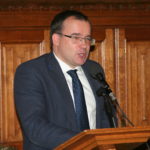
Mr Gareth Thomas MP and Chair of Jain APPG spoke briefly about how the Jain APPG planned to tackle the issues faced by the Jain community in terms of national recognition. Non-recognition had meant no Jain representation at various national events. Priority was to get the Jain religion listed in the census form so that Jains could correctly register under their faith and be counted.
He also mentioned that whilst there were a few Jain councillors – there were yet to be Jain MPs. This is something for the community to consider and evolve a solution.
Mr Roger Highfield, Director of External Affairs at the Science Museum spoke about the forthcoming exhibition at the Museum to celebrate the UK-India Year of Culture. There were plans to have exhibits which show how the Jain mathematicians in India, many centuries ago had invented the number ‘zero’. This enabled the development of calculus and enabled Newton to discover the theory of motion. Details of the exhibition can be seen by clicking here.
Lord Dolar Popat and Bob Blackman MP for Harrow East both congratulated the Institute on organising the excellent program.
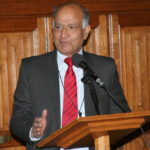
Mr C B Patel, the Managing Editor of Gujarat Samachar and the Asian Voice complimented the Jain community on the community’s success in both the professional and business fields and the community’s wealth generating capacity. He sounded a caution that whilst it is good to generate the wealth but a discipline must be exerted and that the wealth earned should be put to good use.
The Presidents of the two main Jain organisations in the UK, Mr Tushar Shah of Oshwal Association of the UK and Mr Dhiru Galani of the Navnat Vanik Association of the UK also spoke at the event.
The evening culminated with the award of the OneJAIN Life-Time Achievement Award to Dr Vinod Kapashi for his work in promoting the Jain faith, culture and language in the UK. Mr Mahesh Gosrani read out the citation for Dr Kapashi outlining his achievements since his arrival in the UK. The full text of the citation is attached along with the response given by Dr Kapashi. Mr Gosrani’s citation. Dr Kapashi’s response.
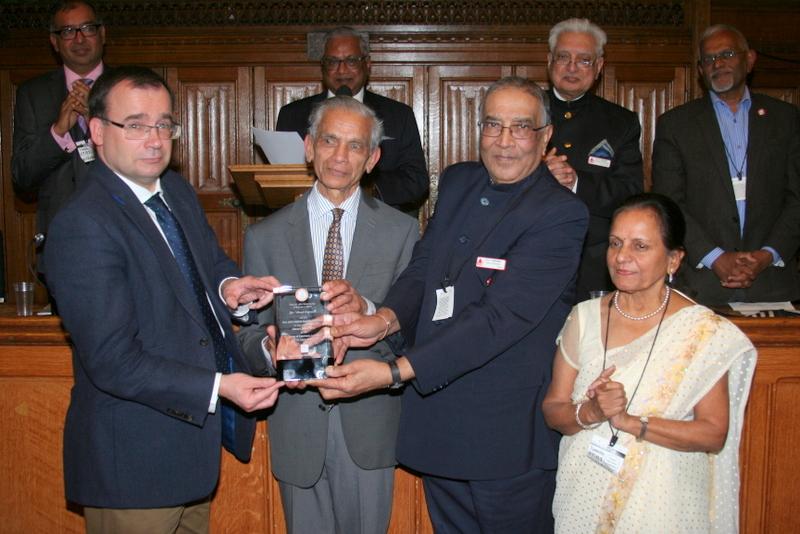
Finally, Mr Kumar Mehta gave the vote of thanks to the speakers, the members of the audience and the management of the House of Commons for letting the institute use this magnificent venue.
Following the end of formal program – meet and greet session continued for another half an hour where views on the program contents were exchanged and praised.
PHOTO GALLERY
